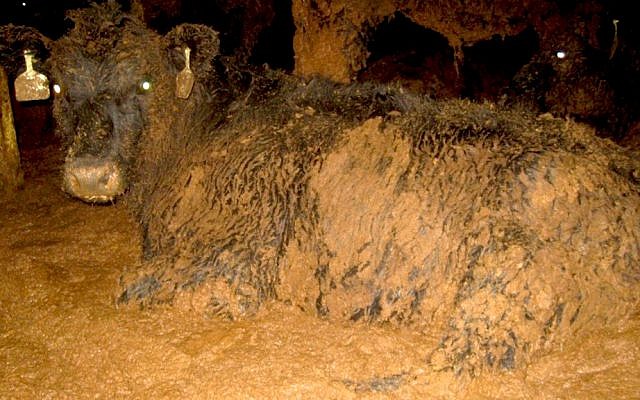Where Does Israel Get Its Beef
The number of live animals shipped to Israel for fattening and slaughter shot up by 51 percent during the first quarter of this year, compared with the same period last year, Agriculture Ministry figures (in Hebrew) show.
Between January and March this year, 207,214 calves and lambs arrived at the country's ports (13,400 of which were destined for the Palestinian Authority), up from 136,983 in the first quarter of 2020.
Last year, a total of 601,741 animals arrived in Israel on live shipments, compared with an all-time high of 691,327 in 2019.
Numerous reports have exposed animal cruelty aboard the ships, which resemble massive multistory parking lots carrying from 1,000 to 20,000 cattle, or 100,000 sheep, or a combination.

Cattle lying in excrement on a live transport ship from Australia. (Courtesy Dr. Lynn Simpson)
Once in Israel, the animals are loaded onto trucks for journeys that can take hours to slaughterhouses or to pre-slaughter fattening facilities. They are treated with antibiotics against the infections that overcrowding encourages.
In May last year, the state comptroller panned the Agriculture Ministry for failing to investigate problems relating to live shipments and for failing to punish shipowners or importers who repeatedly broke the rules. Furthermore, said the report, not enough was being done to monitor, deal with and develop new plans to limit the spread of diseases that can jump from livestock to infect humans.
The report said, "In view of the harm to animal welfare in these transports, it is appropriate that the ministry continues to promote the priority of importing chilled meat from abroad, instead of importing livestock, a move that will address those seeking to consume fresh meat without causing further suffering to animals during sea transports."
The Economy Ministry has gradually increased quotas for duty-free imports of chilled meat. Last year, permits were given to import more than than 21,000 tons of it — 17,500 tons under duty-free import quotas and the rest according to bilateral agreements.

Sheep being shipped for fattening and slaughter in multi-story vessels. (YouTube screenshot)
But this constitutes just a fraction of all meat consumed.
Israel is the fourth-biggest beef and veal consumer in the OECD, after Brazil, the US and Argentina, with annual per capita beef consumption in 2018 standing at 20.5 kilograms (45.2 pounds) and totaling 137,000 tons.
Around three quarters of the shipping, fattening and slaughter industries are controlled by just two powerful companies, Tnuva and Dabbach.
The volume of live shipments increased sharply after 1999 when the Finance Ministry abolished customs duties on young calves imported for fattening and after duties on heavier calves were scrapped by a government decision in 2014, ostensibly to help lower prices and the cost of living. (Duties on imports of lambs are relatively low).
Despite this, beef prices rose by up to six percent between 2013 and the end of 2018, according to an analysis by the Knesset research department produced (in Hebrew) in July 2020.

Staking out a claim for the annual Independence Day grill fest at Jerusalem's Sacher Park in 2009 (Deborah Sinai/Flash 90)
Imports of live calves more than doubled in the years 2014 to 2019 from 98,247 heads to 229,122, with the number of countries supplying the animals also growing.
In November 2018, a month before the Knesset dissolved, kickstarting four inconclusive elections, the Knesset green-lighted a bill in its preliminary reading to gradually reduce livestock numbers being imported into Israel and to stop them completely within three years, moving entirely to the import of chilled meat.
The bill, proposed by Likud lawmaker Miki Zohar, was passed without opposition. But the political deadlock has prevented it from making further headway.
Commenting on the figures for this year's first quarter, the animal rights organization Animals Now said in a statement, "The dizzying increase in the number of live shipments proves that the minister of agriculture shows contempt for the state comptroller and the Israeli public. While 86% of Israelis support legislation to stop live shipments, the Agriculture Ministry is taking advantage of the political situation.
"By 2021 live shipments should already have been history."
Is our work important to you?
Do you rely on The Times of Israel for accurate and insightful news on Israel and the Jewish world? If so, please join The Times of Israel Community. For as little as $6/month, you will:
- Support our independent journalism;
- Enjoy an ad-free experience on the ToI site, apps and emails; and
- Gain access to exclusive content shared only with the ToI Community, including weekly letters from founding editor David Horovitz.
Join the Times of Israel Community Join our Community Already a member? Sign in to stop seeing this
You're a dedicated reader

We're really pleased that you've read X Times of Israel articles in the past month.
That's why we started the Times of Israel ten years ago - to provide discerning readers like you with must-read coverage of Israel and the Jewish world.
So now we have a request. Unlike other news outlets, we haven't put up a paywall. But as the journalism we do is costly, we invite readers for whom The Times of Israel has become important to help support our work by joining The Times of Israel Community.
For as little as $6 a month you can help support our quality journalism while enjoying The Times of Israel AD-FREE, as well as accessing exclusive content available only to Times of Israel Community members.
Thank you,
David Horovitz, Founding Editor of The Times of Israel
Join Our Community Join Our Community Already a member? Sign in to stop seeing this
brooksbeggersewen.blogspot.com
Source: https://www.timesofisrael.com/despite-calls-for-reform-imports-of-live-animals-for-meat-up-51-this-quarter/
0 Response to "Where Does Israel Get Its Beef"
Post a Comment